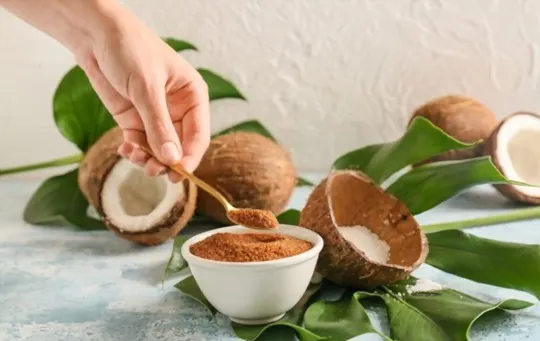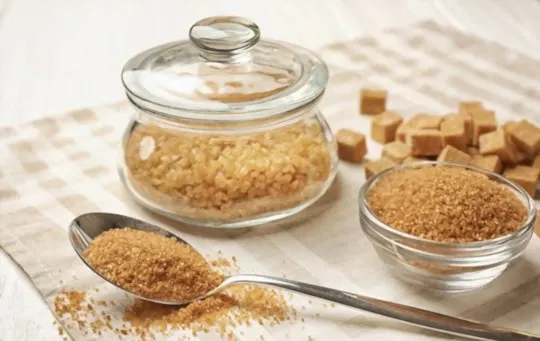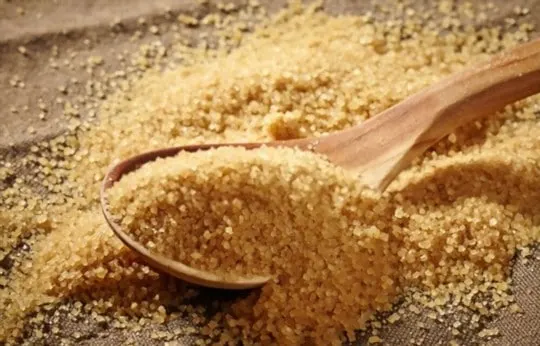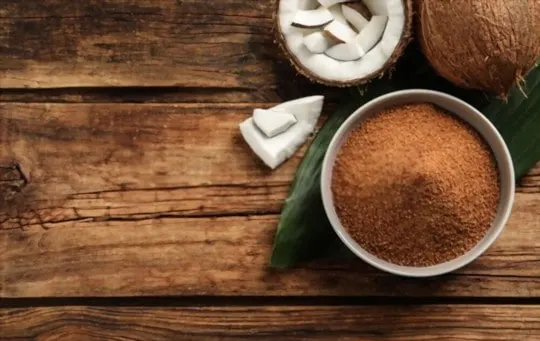Summary of key points
In the context of coconut sugar versus brown sugar, the main differences lie in their sourcing and nutritional content. Coconut sugar is derived from the sap of coconut palm flowers and is considered a healthier alternative due to its lower glycemic index and higher nutrient content. On the other hand, brown sugar is primarily made from refined or partially refined sugarcane with added molasses, providing a distinct caramel flavor and moist texture. The choice between the two sugars depends on individual dietary preferences and the desired flavor profile for the intended recipe.
Are you unsure of the difference between coconut sugar and brown sugar?
If so, you’re not alone.
With more and more alternative sweeteners appearing in grocery stores each day, it can be very confusing to determine which is best for baking or as a substitute in recipes.
To help make things easier, this blog post will provide readers with an in-depth look at the differences between coconut sugar and brown sugar.
From their nutrition facts to taste and texture profiles — so that you can make an informed decision the next time you reach for either one of these popular sugars!

What is Coconut Sugar?

Coconut sugar is a natural sweetener that is gaining popularity as a healthier alternative to regular sugar.
It is made from the sap of coconut palm trees and is minimally processed.
Unlike regular table sugar, it contains trace amounts of nutrients such as iron, zinc, and calcium.
As mentioned earlier, coconut sugar has a unique caramel-like flavor that sets it apart from traditional white or brown sugar.
Its low glycemic index also makes it a preferred option for people with diabetes or anyone trying to reduce their sugar intake.
Overall, coconut sugar can be a healthy and flavorful substitute for white or brown sugar in recipes or as a sweetener in beverages.
However, like any sweetener, moderation is key.
What is Brown Sugar?

Brown sugar is a type of sugar that contains molasses, resulting in its distinctive brown color and slight caramel flavor.
It is most commonly made from white granulated sugar by adding molasses back into it after the refining process.
The amount of molasses added can vary, affecting the level of color and flavor intensity.
Brown sugar has a slightly softer texture than regular white granulated sugar due to the presence of molasses, which also makes it stickier.
It is not considered as healthy as raw or unrefined sugars due to its high calorie content and small amounts of nutrients.
In baking, brown sugar adds moisture and richness to recipes such as cookies or cakes.
It also helps baked goods retain moisture for longer periods than if using white granulated sugar alone.
In cooking, some savory dishes may call for brown sugar as an ingredient in sauces or marinades to balance out spiciness or acidity.
Coconut Sugar vs. Brown Sugar: What’s The Difference?

When it comes to sweeteners, there are a lot of options available in the market, making it difficult sometimes to choose which one to use.
Two popular types of sugar are coconut sugar and brown sugar.
While they may look similar and both have a distinct taste, coconut sugar and brown sugar have some significant differences worth noting.
Coconut sugar is derived from the sap of the coconut palm tree instead of sugarcane plants like brown sugar.
It is boiled down into granules while still containing moisture.
On the other hand, brown sugar undergoes refining processes that involve adding molasses to white granulated cane sugars that have been dried.
Another vital difference between these two sugars is their glycemic index (GI).
The GI measures how quickly carbohydrates break down into glucose in our bodies.
Coconut sugar has a lower GI than regular table or even brown sugars.
This means that it does not cause spikes in blood glucose levels as rapidly as its counterparts.
In terms of nutritional value, coconut sugar contains more nutrients like iron, zinc, calcium and potassium compared to brown sugar which doesn’t contain much nutritionally.
When it comes to sustainability, coconut sugar is considered more sustainable compared to brown sugar which is mostly considered unsustainable due to the environmental impact it has during production.
Nutrition Comparison
When comparing coconut sugar and brown sugar, there are subtle differences in their nutritional profiles.
While both types of sugars are still added sugars and should be consumed in moderation, they do have some varying levels of nutrients.
In a comparison of one teaspoon (4 grams) of each, coconut sugar has 15 calories and 4 grams of carbohydrates, while brown sugar has 11 calories and 3 grams of carbohydrates.
The difference in calorie count is not significant, but coconut sugar does have slightly more carbs per teaspoon.
Coconut sugar also contains small amounts of nutrients such as iron, zinc, and potassium.
In comparison, brown sugar has almost no additional micronutrients.
It’s worth noting that both types of sugar still have the same effect on blood glucose levels and should be limited by those with diabetes or blood sugar concerns.
Flavor and Culinary Uses
Coconut sugar and brown sugar have their unique flavors, which make them stand out from each other.
Coconut sugar has a caramel taste with a distinct coconut flavor, while brown sugar tastes like molasses because of the presence of molasses.
Both sugars can be used in various culinary dishes, but they do not have interchangeable properties because of their individual taste profiles.
Coconut sugar is often used in Asian cuisines as it complements the ingredients that are commonly found in these dishes.
It can be found in curries or stir-fries to balance out any spiciness or acidity.
While it also works well in sweet treats like cakes or cookies due to its slightly nutty taste.
Brown sugar is more versatile and widely used in baking recipes worldwide since it adds sweetness with a tinge of bitterness that creates a balance.
It works well when making caramel for caramelized dishes or glazes for meats such as ham or pork belly.
In summary, both coconut sugar and brown sugar offer different flavors and culinary uses due to their unique characteristics.
One cannot substitute the other without compromising on taste.
Glycemic Index Comparison
Coconut sugar and brown sugar differ in their glycemic index.
Glycemic index is a measurement of how quickly a food raises blood sugar levels.
The higher the glycemic index, the faster the rise in blood sugar levels.
From the above table, it is clear that coconut sugar has a lower glycemic index than brown sugar.
This means that coconut sugar does not cause a rapid spike in blood sugar levels as compared to brown sugar.
Also, coconut sugar has a low glycemic load which is an indication of its effect on blood glucose levels.
It is important to note that while both sugars have a high calorie content, consuming food with lower glycemic indices may result in better glucose control and improved overall health.
Therefore, choosing coconut sugar over brown sugar could be beneficial for those who are monitoring their carbohydrate intake or watching their blood glucose levels.
In summary, if you are concerned about your glycemic intake and want to maintain healthy blood sugar levels, replacing brown sugar with coconut sugar might be worth considering.
Which is Healthier: Coconut Sugar or Brown Sugar?

When it comes to which is healthier between coconut sugar and brown sugar, the answer isn’t straightforward.
Both sugars undergo minimal processing and contain some nutrients like iron, calcium, and potassium.
However, there are some differences in terms of their glycemic index and production process that might make one more preferable over the other.
As you can see, both sugars have similar calorie and carbohydrate contents.
However, coconut sugar contains more potassium but less calcium than brown sugar.
Additionally, coconut sugar has a lower glycemic index compared to brown sugar.
The glycemic index measures how quickly a food raises blood glucose levels after consumption.
High-glycemic foods can cause spikes in blood sugar levels that may lead to health problems like diabetes or weight gain.
While both coconut sugar and brown sugar have relatively low glycemic indexes when compared to white table sugar, experts generally consider coconut sugar to be healthier due to its lower value.
In summary, if you’re looking for a healthier sweetener option between coconut and brown sugars based on nutritional values alone, then coconut sugar may have a slight advantage due to its lower glycemic index and higher potassium content.
However, both options are still forms of added sugars that should be consumed moderately as part of overall healthy diets.
Where to Buy Coconut Sugar and Brown Sugar?

If you’re interested in buying coconut sugar or brown sugar, there are a few options available to you.
You can find them at your local grocery store, health food store, or online retailer.
As you can see, coconut sugar and brown sugar are widely available and can be found at most retailers.
When searching for these types of sugars online, it’s important to read product reviews and check the seller’s ratings before making a purchase.
This will ensure that you receive high-quality and authentic products.
If possible, try to buy organic and non-GMO sugars to avoid any potential health risks associated with consuming genetically modified crops.
Additionally, consider purchasing from fair-trade certified sources to support ethical farming practices around the world.
Conclusion
Overall, while both coconut sugar and brown sugar are commonly used as alternative sweeteners to white granulated sugar, they have distinct differences in terms of glycemic index and nutrient content.
If you’re looking for a natural sweetener that won’t cause spikes in blood sugar levels, coconut sugar may be a better option.
On the other hand, if you’re more concerned about taste and don’t mind the higher glycemic index, then brown sugar may be your go-to choice.
When making any dietary changes or adding new ingredients to your cooking or baking routine, it’s always important to consult with a healthcare professional or registered dietitian to ensure you’re making informed choices that align with your health goals.
